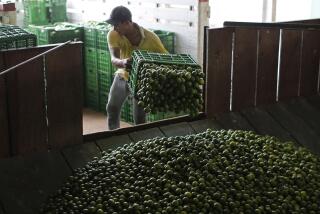ASIA : Between U.S. and Chile, a Grape Divide : A report that the 1989 poison scare was probably a hoax has growers angry once again. And California counterparts aren’t helping matters.
SANTIAGO, Chile — The case of the “poisoned grapes” once again has Chileans bursting with pent-up wrath: Newly revealed evidence supports Chilean arguments that a 1989 poison scare, which resulted in a costly U.S. ban on Chilean fruit, was triggered by a hoax.
In March, 1989, an anonymous caller told the U.S. Embassy in Santiago that Chilean fruit shipped to the United States had been poisoned. Food and Drug Administration inspectors at Philadelphia’s port found two punctured grapes and took them to an FDA laboratory, which determined that they contained cyanide.
After the FDA announced an embargo on all fruit from Chile, orders were canceled around the world, shipments were stopped and tons of fruit were destroyed.
Growers, exporters and other companies later sued the FDA, claiming $212 million in damages.
A federal court threw out the lawsuit. But a panel of the U.S. Circuit Court of Appeals in Philadelphia ruled last February that the action can proceed. A U.S. government appeal against that ruling is pending before the full court.
Last week, the Wall Street Journal published the transcript of a recorded telephone call to the U.S. Embassy here in June, 1989, three months after the poison scare. The embassy operator recognized the caller as the same man who made the original poison warning. This time, the caller said it was all a hoax, “only a lie” to scare the government.
The revelation has deepened Chilean outrage over the case.
Congressman Juan Carlos Latorre, a member of the governing Christian Democratic Party, said the fact that the June call was kept secret for more than five years shows that “we are faced with a Grapegate”--an allusion to the Watergate cover-up conspiracy.
A Washington attorney representing Chilean growers and exporters obtained the transcript from the State Department through the Freedom of Information Act and passed it to the Journal.
*
“It simply knocks down the whole argument of the Philadelphia laboratory that there was cyanide,” said Ricardo Ariztia, president of Chile’s Federation of Fruit Producers. “Just as the caller said, this is a big lie.”
After the embargo, Ariztia’s federation and the Chilean Assn. of Exporters commissioned laboratory studies at UC Davis and a Chilean university.
Ariztia said the studies showed that if any cyanide had been injected into grapes in Chile, they would have decomposed or the poison would have disappeared by the time the fruit reached the United States. So the FDA lab must have erred, he said.
But a report by the General Accounting Office said other tests have shown that grapes can retain detectable amounts of cyanide for long periods without decomposing.
Meanwhile, the California Table Grape Commission has added insult to injury with an advertisement campaign in the United States against Chilean grapes. One recent trade magazine ad shows a full cluster of grapes “from California” beside a scraggly one with only five grapes “from Chile.” It warns wholesale fruit buyers, “Don’t gamble with your order during the holidays.”
“Over the past five years, the average shipment of California grapes totaled 28.5 million pounds for the first week of December, Chilean grapes 2.4 million pounds,” the ad says. “Do the math. The smart money’s on California grapes.”
Most Chilean grapes, harvested in the South American summer between between January and March, do not compete with most California grapes, harvested between May and August. But some Chilean grapes reach U.S. markets while late California grapes are still available.
Ariztia said he has offered to negotiate an agreement with California growers for a joint advertising campaign.
But so far, he said, the California growers “prefer a direct attack on Chile.”
More to Read
Sign up for Essential California
The most important California stories and recommendations in your inbox every morning.
You may occasionally receive promotional content from the Los Angeles Times.










